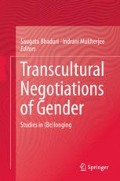Abstract
Although the concept of ‘muse’ in Bengali poetry was borrowed from the West in the nineteenth century by several poets, Tagore was the first person who extracted the very best qualities from nature and the human and created his own muse, ‘Manasi’. Though a number of iconic women were portrayed in the writings of Jibanananda Das, another legendary poet of the post-Tagore era in Bengal, they never became the muse for the poet because the blow of the First and Second World Wars was strong enough to shatter the concept of love, trust, ethical values as well as romantic musings of life in common people all over the world. Very surprisingly, the idea of the muse came back in Bengali poetry nearly a decade after Jibanananda. Binoy Majumdar’s ‘Gayatri’ or Sunil Gangopadhyay’s ‘Neera’ once again evoked the sense of hope, desire, refusal and sorrow among the young middle class readers in a broken time. The portrayal of the ‘muse’ or the ‘beloved’ has also undergone a gradual change during this time. Tagore’s women characters were pioneers of the new Cultural Revolution, but they mostly belonged to an elite class. However, Gayatri or Neera was the poetic representation of any educated and urban modern Bengali woman of post-partition Bengal. In this work, I try to focus first on the evolution of the concept of beloved or muse in modern Bengali poetry, and second the influence of the socio-cultural terrain of post-partition Bengal and the changing position of women in Indian society on this evolution.
Access this chapter
Tax calculation will be finalised at checkout
Purchases are for personal use only
References
Bose, Buddhadeva. 2010. Kabitasangraha 1. Kolkata: Deys Publishing.
Das, Jibanananda. 2007. Shreshtha Kabita. Kolkata: Bharabi.
Dutta, Michael Madhusudan 2007. Madhusudan Rachanabali (complete works) Basu, Bishnu and Dutta Tirthapati eds. Kolkata: Tulikalam.
Gangopadhyay, Sunil. 2010. Kabita Samagra. Kolkata: Ananda Publishers.
Kundu, Tridib Santapa 2006. Partition (1947) and the empowerment of Bengali women. In Empowerment of women—problems and prospects, ed. Ghatak, Sandip, 52–54. Asansol.
Ray, Bharati 2010. New woman in Rabindranath Tagore’s short stories: An interrogation of “laboratory”. ASIATIC 4:2 72.
Roy, Dilip Kumar. 1997. Teerthankar. Kolkata: General Printers and Publishers Pvt. Ltd.
Tharu, Susie, and K. Lalita (eds.). 1991. Women writing in India: 600 B.C. to early 20th century. New York: The Feminist Press.
Vallejo, Catharina. 2007. From muse to poet: Paratextual practices of women poets in Cuba at the end of the nineteenth-century. Decimonónica 4(1): 80–93.
Wadud, Kazi Abdul 1925 “Rabindranather Kabita”. Prabasi, Magh, 1332 BS/1925 CE.
Author information
Authors and Affiliations
Corresponding author
Editor information
Editors and Affiliations
Rights and permissions
Copyright information
© 2016 Springer India
About this chapter
Cite this chapter
Chatterjee, S. (2016). Manasi to Neera: The Evolution of the Concept of “Muse” in Modern Bengali Poetry. In: Bhaduri, S., Mukherjee, I. (eds) Transcultural Negotiations of Gender. Springer, New Delhi. https://doi.org/10.1007/978-81-322-2437-2_17
Download citation
DOI: https://doi.org/10.1007/978-81-322-2437-2_17
Published:
Publisher Name: Springer, New Delhi
Print ISBN: 978-81-322-2436-5
Online ISBN: 978-81-322-2437-2
eBook Packages: Social SciencesSocial Sciences (R0)

